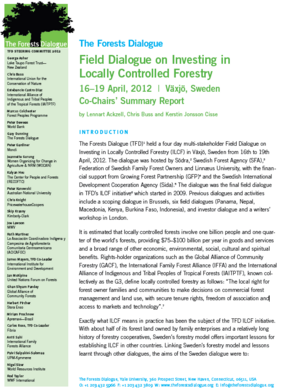Co-Chairs’ Summary : Ninth Dialogue on ILCF - Sweden Field Dialogue
The Forests Dialogue (TFD) held a four day multi-stakeholder Field Dialogue on Investing in Locally Controlled Forestry (ILCF) in Växjö, Sweden from 16th to 19th April, 2012. The dialogue was hosted by Södra, Swedish Forest Agency (SFA), Federation of Swedish Family Forest Owners and Linnæus University, with the financial support from Growing Forest Partnership (GFP) and the Swedish International Development Cooperation Agency (Sida). The dialogue was the final field dialogue in TFD’s ILCF initiative which started in 2009. Previous dialogues and activities include a scoping dialogue in Brussels, six field dialogues (Panama, Nepal, Macedonia, Kenya, Burkina Faso, Indonesia), and investor dialogue and a writers’ workshop in London.
It is estimated that locally controlled forests involve one billion people and one quarter of the world‘s forests, providing $75–$100 billion per year in goods and services and a broad range of other economic, environmental, social, cultural and spiritual benefits. Rights-holder organizations such as the Global Alliance of Community Forestry (GACF), the International Family Forest Alliance (IFFA) and the International Alliance of Indigenous and Tribal Peoples of Tropical Forests (IAITPTF), known collectively as the G3, define locally controlled forestry as follows: “The local right for forest owner families and communities to make decisions on commercial forest management and land use, with secure tenure rights, freedom of association and access to markets and technology”.
Exactly what ILCF means in practice has been the subject of the TFD ILCF initiative. With about half of its forest land owned by family enterprises and a relatively long history of forestry cooperatives, Sweden’s forestry model offers important lessons for establishing ILCF in other countries. Linking Sweden’s forestry model and lessons learnt through other dialogues, the aims of the Sweden dialogue were to:
- Define key steps that are critical for successful deals for ILCF in Sweden;
- Identify concrete actions for developing new partnerships;
- Understand how to improve financing for LCF.
The dialogue brought together 20 international and 15 local stakeholders representing a wide spectrum of stakeholder groups, including Indigenous Peoples, local community, small land owners, forestry investors and companies, development assistance agencies, national governments, inter-governmental organizations, and international and national non-governmental organizations (see participant list starting on page 12).
This report summarizes key observations and discussions from the dialogue.

